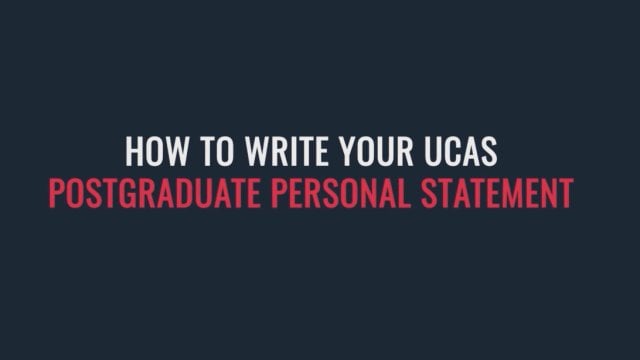
Your postgraduate personal statement is your chance to get noticed for your expertise and experience you’ve gathered. It’s an important part of the application process as it allows you to talk about yourself and your passions and prove the value you can bring to your chosen university.
In this article, we’re going to talk you through how to write a postgraduate personal statement that stands out and gives you the best chance of being offered a place on the master’s programme you’re applying for.
'Tie in your undergraduate studies – for example, if you did your dissertation on something and you’d like to expand on it in your master’s. Trying to link the two together is something that’s distinct from the undergraduate personal statement.'
Be specificRemember that a postgraduate personal statement needs you to talk specifically about the university you’ve chosen.
Demonstrate experienceUniversities will be looking for postgraduate students who are able to demonstrate expertise in a particular subject – so include that.
Show what you've learntTell the university about your university life as an undergraduate and include any clubs or societies you were involved in.
Keep it simple Be succinct, show your understanding and knowledge of your subject, and your ambition to improve.You’ll have already written a personal statement for your undergraduate study, so you’ll know the importance of preparation. There are two things to think about when you’re planning:
Before you start writing, take some time to think about the key things you’d want your chosen university to know about you, and get them down on paper.

Remember that a postgraduate personal statement needs you to talk specifically about the university you’ve chosen.
Universities will be looking for postgraduate students who are able to demonstrate expertise in a particular subject – so include that.
Tell the university about your university life as an undergraduate and include any clubs or societies you were involved in.
If you're not already using ChatGPT or other AI tools, you've probably heard about them. But should they be used to help with your UCAS personal statements? Is it cheating? Or can they be helpful in crafting your personal statement?
Admissions tutors will be reading a lot of personal statements so it’s important to grab their attention right from the start.
You can find a full guide on How to start a personal statement: The attention grabber but here are the main things for you to think about.
Now you’re ready to start talking about the course and subject you’re applying for.
There are four main areas you’ll need to cover in this section of your personal statement.
Universities like to know the abilities you have that’ll help you on the course, or generally with life at university. Don’t forget to include evidence to back up why you’re so passionate about the programme you’ve chosen.